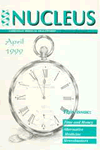Deadly Questions
Deadly Questions in the October 1998 issue of Nucleus left me disappointed by its negative attitude to the Human Genome Project and to pre-implantation genetic diagnosis.Firstly, the Human Genome project is not geared to ‘search and destroy’ abnormal fetuses. If it were it would herald the end of the human race as we are all genetically faulty. It is geared to discover the molecular pathology of disease, and so to improve both prevention and treatment; prevention by lifestyle advice, targeted drug treatment, new treatments etc. The Project does give rise to opportunities for human exploitation and major ethical problems but this makes it essential for Christians to be involved. Nucleus readers should rejoice that the Project Director Francis Collins is a committed Christian and we should be praying for him with his huge responsibilities, rather than knocking the Project. Secondly, couples requesting pre-implantation genetic diagnosis face high risks of having offspring with serious genetic disorders. They are mostly those who would not contemplate abortion or who have already experienced abortion for their genetic risk. Nobody calls this a treatment for genetic disorders but it is a possible means of overcoming a very distressing situation. Even within the CMF there are different views on the preimplantation embryo.[1] Those to whom the fertilized egg is of equal value to a 10 week fetus or a newborn baby may reject preimplantation diagnosis but must remember that many Christians and those who have no Christian commitment find disposal of fertilised eggs (pre-implantation embryos) quite distinct from first trimester abortion.
God has brought an encouraging number of Christians into Clinical Genetics. It is important that this continues in Genetics, Reproductive Medicine and Obstetrics where prenatal diagnosis counselling has a major impact. These are people facing the most difficult decisions of their lives who need our care. You are the next generation of Christian doctors who need to consider God’s call to these ‘risky’ specialties. As Christians we need to step out in faith, trusting the Lord to keep us even if we do sometimes get our hands dirty. Apart from seeing patients we can also make a contribution to ethical policies from within these specialties. I continue to thank God for calling me into this challenging branch of medicine.
Caroline Berry
Consultant Clinical Geneticist
Reference
1. Saunders P. Post-coital contraception. Nucleus 1999; January: 3,4.Author's Reply
I support Caroline Berry in affirming that more Christians should enter difficult fields of medicine (including genetics) and, while it is early days, I share her enthusiasm for some of the new therapeutic possibilities that genetic research (including the Human Genome Project) is making possible.
I also have no objection to prenatal screening provided that its aim is the safe identification of genetically impaired individuals for the purposes of treating them and preparing their families for the birth of a child with special needs.
I do however take issue with the use of preimplantation diagnosis[1] when its sole purpose is to identify and dispose of genetically impaired embryos. In my view this approach sacrifices the weak to make life easier for the strong and runs directly counter to the Christian ethic whereby the strong make sacrifices for the weak. The current UK pre-implantation programme involves identifying and destroying embryos with cystic fibrosis, Tay-Sachs disease, thalassemia, sickle cell disease and Duchenne muscular dystrophy. No-one is denying that these are serious disabilities which can place a huge strain on individuals and families. But shouldn’t we rather be pursuing strategies of prevention and treatment for these diseases which don’t involve taking (even very early) human life? If we are all genetically impaired (as Dr Berry reminds us); shouldn’t this lead us even more to protect and care for those less fortunate than ourselves - even if it hurts? If ‘getting (one’s) hands dirty’ is simply a euphemism for ‘culling out those unworthy of life’ (as I suspect it is) then how can we justify being party to it?
I believe that carrying the cross in this matter involves committing ourselves to the more costly path of supporting and affirming the value of those with special needs (both before and after birth), dedicating ourselves to developing and using ethical treatments for genetic disease and being prepared to risk alienation by the establishment for our views.
Dr Berry accepts preimplantation diagnosis and embryo disposal because, by her own admission, she attributes the preimplantation embryo very little status. She is not alone. Many other CMF members support her in this stance.
As medical students you will have to make up your own minds on the issue. My views on the status of the embryo are well known[2] as are those of Dr Berry.[3] If you have not already done so you should read the different arguments and decide for yourselves what you think because what you decide will have profound implications for the way you practise medicine. We can’t sit on the fence!
Peter Saunders
































